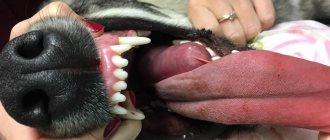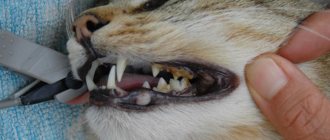Many dog owners are faced with this problem when their pet’s limbs, lips, ears, muzzle suddenly swell, mainly in the eye area, lower jaw, and neck. The development of edema occurs due to excessive accumulation of fluid (transudate) in the subcutaneous layers, which is explained by an increase in the porosity of the vascular walls.
Swelling of the dog's muzzle is the most common pathology that occurs due to the development of angioedema (Quincke's edema) . If, in addition to swelling, the epidermis is covered with small red blisters, this indicates the development of urticaria (urticaria). Despite the fact that the animal’s condition may return to normal after a few hours or days, it is better to immediately seek help from a veterinarian.
Etiology, causes of swelling
The muzzle of dogs and other pets can swell for a variety of reasons. The etiology and pathogenesis of this pathology include various unfavorable exo- and endogenous factors. Swelling may affect the entire face or develop on only one side (unilateral edema). Undoubtedly, such a condition causes panic among owners. The eyes become swollen, the eyelids, lips, and ears swell, the head increases in volume, and the appearance of the beloved dog changes beyond recognition. Treatment depends on the root cause that provoked this condition.
Causes of edema in dogs:
- poisoning with chemicals (pesticides, acitonomofen);
- hematomas of various types;
- infectious, viral diseases;
- acute allergic reaction;
- phlegmon, hemangioma;
- food allergies;
- infected wounds;
- a sharp change in diet and feed, if the dog is kept on ready-made food;
- severe helminthic infestation;
- neoplasms (osteosarcoma, lymphosarcoma, chondrosarcoma);
- inflammation of muscle structures (myositis).
Swelling of a dog’s muzzle can occur after an insect bite or if the pet, while “hunting,” swallowed a bee, bumblebee, or gadfly.
In case of danger, stinging insects release poison from their sting, and in the animals’ bodies a protective reaction immediately occurs, aimed at neutralizing toxins and poisons. Swelling occurs immediately or after a few hours at the site of the insect bite.
Six reasons why a dog's face swells
Swelling of a dog's muzzle can cause shock and, at a minimum, fear among owners. The main thing is not to lose self-control. You should immediately go to the nearest veterinary clinic.
Causes of muzzle swelling
There are too many reasons for the reaction. Excessive fluid accumulation may occur in one half or the entire muzzle.
Most often this occurs due to:
- Infection / diffuse purulent inflammation of fiber, connective tissue;
- Allergy;
- Paracetamol poisoning;
- Sinyakov;
- Pathologies represented by newly formed tissue;
- Inflammation of muscle tissue.
When your pet has excess fluid accumulation and you don't know what to do, seek advice from friends or other unverified sources, it is important not to self-medicate.
Experiments often lead to death, so every minute counts. Pathology is not the norm, and there are many reasons for its formation.
The results of self-medication often only worsen the situation.
First aid for swelling
There are often circumstances when it is impossible to quickly seek help from a specialist. You must have minimal knowledge of first aid for your pet.
Perform visual diagnostics:
- Where is the swelling located: on the left, right side of the muzzle, affecting the larynx, tongue, eyeballs and gums;
- How the pet breathes: normally or often with signs of asphyxia;
- Presence of visual damage: bites, lacerations or other deformities;
- Are swellings diagnosed: allergic rash, other purulent or ordinary rashes;
- How dense is the swelling: uniform or with the presence of different compactions;
Determine what caused the fluid accumulation:
- Changing your diet;
- Walks in the fields or in the forest;
- Possible contact with dangerous insects or snakes, fights with other pets or predators;
- Taking pharmacological agents or an injection.
Studying and analyzing the information will allow you to determine the cause of the problem and choose a treatment method.
Dog's face is swollen after vaccination
There are no options to vaccinate or refuse it. This is the only way that will protect your dog from a contagious disease that affects the nervous system, infection with other viral or bacterial infections. During immunization, active viral strains are introduced into the animal's body.
Complications may appear in the first few days after administration of the drug; a post-vaccination reaction is observed. Therefore, in order to prevent the development of dangerous complications, it is worth monitoring the general well-being of your pet for the first 7 days.
Dogs tolerate artificial immunization well. Immunobiological products that are supplied to the market, in exceptional cases, provoke negative reactions. But, it is not recommended to rule out that after the administration of even a high-quality drug, if all the rules are followed, the dog may experience consequences, which are conventionally divided into local and general.
The reaction to the drug appears half an hour after its administration (in rare cases, after 24 hours). It all depends on the personal characteristics of physiology.
Swelling of the muzzle is not a classic reaction to immunization, and is diagnosed in 10 percent of cases. In addition, respiratory function may be impaired and heart rate may change. Without first aid, swelling will spread down the throat and can lead to suffocation. If the animal is not helped quickly, the swelling will be fatal.
The injection site of the immunological drug must be washed with water and an antiseptic applied. The most common peroxide or chlorhexidine will do. Veterinarians, before carrying out all planned manipulations, give the animal antihistamines.
The animal's muzzle is swollen after a bite
During summer walks, the animal may be bitten by various insects, stray dogs or wild animals. A mosquito bite can cause hives or swelling of the face. It is important to give your pet any antihistamine (one that the person is taking can also be used).
Swelling can be of varying complexity. Depending on the condition of the pet, such medications are recommended.
If the swelling has not spread to the pharynx, then active substances are recommended: suprastin, fenkarol, tavegil, diazolin, furosemide, dehydratin.
If the swelling has spread to the pharynx and the animal has asphyxia, then effective measures are necessary. It is better to give the animal an injection:
- Prednisolone or its analogue from the class of corticosteroids. The drug is administered intramuscularly;
- Atropine under the skin;
- Urgently take the animal to the veterinarian.
A symptom characteristic of an angioedema allergic reaction leading to asphyxia. The development of edema occurs rapidly and is of genetic origin, the aggravation of which occurs as a reaction of the body to the penetration of an allergen.
Why is my dog's face swollen and itchy?
If the animal has a reaction, and at the same time, injuries and inflammation of simple or skeletal muscles are excluded. It is distinguished by partial manifestations of swelling in the cheekbone area, which manifests itself as a result of:
- Old injuries, as well as infectious processes;
- Allergies.
Most often, swelling is accompanied by pain, increased temperature, and the formation of lumps with pus. Treatment depends on diagnostic results, which are performed in a hospital setting.
The appearance of various neoplasms that have a different nature: benign or malignant. Often the visual symptoms of the disease are similar to allergies, but the use of classical drugs does not bring results. This affects:
- larynx, organs of the respiratory system;
- bone tissue and muscles.
Neoplasms are subject to accurate diagnosis, which is carried out in the laboratory during:
- general tests, as well as biopsies of necessary tissues;
- research using ultrasound and magnetic radiation.
Determining the cause of swelling and itching at an early stage increases the likelihood of a successful course of the disease and a quick recovery. In an advanced stage, an animal is extremely difficult to save.
What if only half of your dog's face is swollen?
The symptom makes itself felt with hematomas and various injuries. Fluid accumulation occurs on one side of the muzzle. The swelling may occur as a result of an insect bite, and treatment will depend on the diagnosis. If an infection is found, the doctor will open and clean the swollen area.
If swelling on the right or left side is the result of an allergic reaction, antihistamines or corticosteroids will be needed. If the tumor is caused by a malignant tumor, treatment will depend on its type. In case of inflammation of the skeletal muscles, the swollen area is treated with ointments against inflammation.
To provide first aid:
- An anesthetic is administered;
- A breathing tube is inserted through the mouth or a tracheostomy is performed. In this way, the animal can be provided with oxygen;
- If necessary, drugs are administered by drip.
The owners most likely will not be able to carry out the above manipulations on their own. The conclusion is simple: if swelling appears on your pet’s face, take him to the veterinary clinic.
Source: https://RealPet.ru/zdorovie/otek-mordy-u-sobaki.html
What to do
Before starting treatment, it is necessary to establish what caused the swelling. The optimal treatment therapy and treatment regimen will be selected by the attending veterinarian after a comprehensive diagnosis. It is very important to neutralize the effect of the allergen as quickly as possible. First aid can be provided at home. This will help avoid the development of possible complications.
If the cause of swelling is an acute allergic reaction, an intramuscular injection of diphenhydramine, epinephrine, or fenkarol . You can give your dog antihistamines - tavegil, zodiac, prednisone, dexamethasone . If the swelling does not decrease, take your pet to a veterinary hospital.
Important! Antihistamines are also prescribed to animals for allergies, severe itching, dermatitis, and urticaria. At all stages of development, allergic manifestations are controlled by steroid hormones.
If your dog's face is swollen after an insect bite, treat the swelling and affected area with an alcohol solution of iodine, brilliant green, or any other antiseptic solution. Give an antihistamine at the correct dosage. Carefully monitor your pet's condition for two to three days.
The dog's face is swollen: how to provide first aid?
If a dog's muzzle is swollen, the owner's first natural reaction is shock. Seeing a pet in such distress is not pleasant. A careful inspection and analysis of the situation that has arisen is what the owner needs to do immediately.
The reason may be everyday: an allergy or a fight, but the possibility of a serious illness cannot be ruled out. Therefore, the sooner the dog is examined by a veterinarian, the lower the risk of negative consequences.
Visual inspection and situation assessment
The first recommendation to the owner, if the dog has a swollen muzzle, is to contact a veterinary clinic as soon as possible. But there are circumstances when it is impossible to quickly show your pet to a doctor. Therefore, you need to be prepared to come to the dog’s aid yourself.
Carry out a visual inspection:
- Location of the tumor: on one side of the muzzle or both, whether it affects the larynx, eyes, gums.
- Breathing: normal or rapid with signs of shortness of breath.
- Presence of external injuries: bites, lacerations, scratches.
- Are there local swellings: blisters, pimples.
- Edema density: uniform or with compactions.
Restore what events preceded the tumor:
- nutrition;
- field or forest walks;
- possible insect or snake bites, fights;
- taking medications in tablets or injections.
This information will allow you to localize the problem and choose the right first aid method.
Simple reasons and emergency measures
Practice shows that most often a tumor occurs as a result of allergic reactions, the causes of which can be:
- Medications.
- Food components.
- Smells of herbs or flowers.
- Insect or snake bites.
- Household chemicals.
Allergy
Manifestations can vary in severity. Depending on the dog's condition, the following remedies can be used.
If the tumor does not affect the throat, then use:
- antihistamines: suprastin, fenkarol, tavegil, diazolin;
- diuretics: furosemide, dehydratine;
If the swelling spreads to the larynx and the dog is choking, then urgent measures are needed in the form of injections:
- Prednisolone or its analogue from the group of corticosteroids intramuscularly;
- Atropine subcutaneously;
- Urgent delivery of the dog to the clinic.
Such symptoms are characteristic of angioedema; the disease develops rapidly and may be of a genetic nature, the aggravation of which occurs as a reaction to an allergen.
If a dog's eyes quickly become swollen and the skin begins to itch, then there is a possibility of a bite and subsequent anaphylactic shock. Emergency veterinary assistance is required.
To accurately determine the nature of the allergy, laboratory tests are required to eliminate similar situations in the future
Damage
If a dog’s muzzle is swollen on one side, then a likely and common cause may be wounds and hematomas as a result of dog “showdowns.”
In this case it is necessary:
- injections of corticosteroids as decongestants;
- direct disinfection and treatment of damage;
- A visit to the veterinarian for further examination if the dog's condition does not improve within 2-3 days.
The listed reasons lie on the surface and are easy to detect. But there are also those that are diagnosed only in a clinical setting.
Other causes of tumor
If half of your dog's face is swollen, and injury or allergies are ruled out, then a trip to the veterinarian for examination is necessary.
The causes of swelling may be:
Muscle inflammation or myositis. Characterized by partial swelling of the lower part of the muzzle near the neck, or the upper part, occurs as a result of:
- Old injury.
- Infections.
- Allergic reactions.
The diseases may be accompanied by pain, fever, and the appearance of purulent lumps. Treatment depends on the results of diagnostics, which are performed in a clinical setting.
The appearance of neoplasia or neoplasms, the nature of which can be benign or substandard. Often the external symptoms of the disease are similar to an allergic reaction, but the use of standard medications does not produce results. This may affect:
- oral cavity;
- respiratory system;
- bone tissue of the head.
Accurate diagnosis of neoplasms is carried out in laboratory conditions by:
- blood test;
- tissue biopsies;
- ultrasonic and magnetic studies.
Detection at an early stage increases the likelihood of a positive outcome. In the advanced stage, death is possible.
Thus, if a dog has a swollen muzzle, then a visit to the clinic for a detailed diagnosis is necessary. The obvious, at first glance, cause of swelling and its elimination at home does not exclude the risk of other diseases. Laboratory tests and consultations with a veterinarian will guarantee the dog’s health in the future.
Source: https://kozhasobak.com/u-sobaki-opuhla-morda.html
Other treatment methods
Emergency medical intervention is necessary for angioedema, suffocation, cyanosis of the mucous membranes, and impaired respiratory function. To normalize the condition, intubation and tracheostomy are performed. A tube is inserted into the trachea through the mouth under anesthesia. Demidrol (0.01 mg/kg), prednisolone (0.02 mg/kg), and adrenaline are administered intramuscularly or intravenously.
To eliminate the symptoms of intoxication, IVs are placed and general restorative medications are prescribed. To normalize the functioning of the cardiovascular system, animals are prescribed cardiac glycosides.
In case of acetaminophen poisoning, the edema area is treated with acetylcysteine. This medication reduces the toxic effects of acetaminophen in the liver. Dogs are given IVs to normalize the electrolyte balance in the body.
In case of poisoning that causes swelling of the muzzle, detoxification therapy . For myositis, inflammation of muscle structures, treatment consists of the use of corticosteroids, non-steroidal drugs that have a pronounced anti-edematous, anti-inflammatory effect. Additional therapy may be required in severe cases.
In any case, if your dog’s face begins to swell or other symptoms are noticeable, consult your veterinarian before using any medications.
Swelling of a dog's muzzle - an allergy or a serious illness?
The swollen face of a four-legged friend always causes the owner to worry about the condition of the animal. We will consider below what reasons can provoke swelling in a dog.
Causes of muzzle swelling
If the muzzle is swollen, it is necessary to carefully examine the pet, without losing composure, and try to establish the cause of its occurrence.
There can be several reasons for this illness: from exposure to external factors to the occurrence of edema as a result of internal problems.
So, swelling of the muzzle can occur due to the development of processes in three main directions:
- allergic reaction;
- injury sustained in a fight between animals;
- manifestation of internal diseases: muscle inflammation, malignant neoplasms and others.
The listed reasons show the heterogeneity of the occurrence of the disease in the animal. And, of course, self-medication in this case will not lead to a positive result, and such an experiment on an animal will only complicate diagnosis in a veterinary clinic. Therefore, if a dog develops swelling in its muzzle, you should immediately seek help from a specialist.
Let's consider the causes of swelling in each direction separately.
Why is muzzle swelling dangerous?
If the swelling is caused by a mild allergic reaction or injury, it may go away on its own after some time. But you need to understand that due to the individual characteristics of the body, or in the case of prolonged exposure to an irritating factor, an allergy can provoke Quincke's edema - a dangerous reaction that can be fatal. Symptoms:
- difficulty breathing;
- the animal vomits frequently and profusely;
- wheezing, severe shortness of breath;
- cramps, spasms;
- cyanosis;
- muscle spasms;
- decrease in body temperature;
- heart rhythm disturbance.
Due to muscle cramps, a spasm of the larynx is possible, which makes it difficult for the dog to breathe.
In addition to Quincke due to allergies, other factors also pose a danger. Inflammatory and infectious processes from soft tissues can spread to bone tissue, causing it to slowly rot.
Attention! If the infectious focus is not removed in a timely manner, severe intoxication of the entire body begins. This can lead to problems with the heart, kidneys and other internal organs.
Tumor poses a particular danger as one of the factors that can lead to swelling of a pet’s muzzle. Its cells are characterized by rapid division.
Without a timely diagnosis and treatment, the dog may die.
Types of periostitis in dogs
The inflammatory process can occur in different ways.
It is classified according to the following criteria:
- localization or location;
- extent of distribution;
- stages of occurrence;
- reason for appearance.
Did you know? The first case of periostitis was diagnosed by paleontologists in the Late Cretaceous-Eocene crocodile Borealosuchus formidabilis. There are also documented cases of this disease being found on dinosaur bones.
Depending on its location, the flux in a dog can be localized on the upper or lower jaw. According to the degree of distribution, limited and diffuse fluxes are distinguished. The first is located at one or two adjacent teeth, and the second extends to the entire jaw. According to the stage of occurrence, the inflammatory process is divided into acute and chronic.
There is a classification for the reasons why flux appears in a pet:
- traumatic;
- lymphogenous;
- hematogenous;
- odontogenic.
The first is the result of injury. The second is a natural result of bacteria entering the lymph, the third is the result of contamination of the bloodstream with bacteria from the oral cavity or others. The fourth is the result of existing dental diseases.
Serous
The periosteum (periosteum) is the tissue that covers the outside of the jaw bones.
Injury in this area is possible as a result of:
- dog fight;
- accidents;
- careless play with a pet (bruise, fracture).
Important! A dog who has developed gumboil will avoid playing with toys that involve chewing or engaging in activities that require biting (such as carrying a stick or tug of war).
The injured area swells due to the influx of serous fluid to the injury site. Therefore, this form of flux is called serous.
It is accompanied by:
- swelling;
- sometimes pain.
With minor injuries, the swelling quickly subsides and the situation stabilizes. This form of periostitis is also called simple.
Diffuse
Sometimes fibrous fluid spreads over the surface of the jaw. This is preceded by a large area of bruise. If nothing is done, suppuration may begin. There is a danger that with prolonged inflammation, tissue will begin to break down.
Acute and purulent
Acute inflammation can occur in two forms. It happens:
- serous;
- purulent.
In the serous form, the edema consists of a clear liquid. It dissolves quickly. There is no infection. The purulent form is accompanied by suppuration. Flux is formed, and after a while the purulent contents may begin to leak out.
Did you know? Providing your pet with good oral hygiene can prolong its life by 2
-4
years.
The flux is accompanied by:
- heat;
- pain;
- loss of appetite and activity.
The pet eats little - and only soft food. If there is a wound surface, bacteria can get inside. This increases the likelihood of purulent inflammation. Pus can also be the result of inflammation of the tissues of the tooth itself.
Chronic
The division of inflammatory processes into acute and chronic implies that the former begin suddenly, and the latter last for a long time, then subsiding, then starting again. Chronic inflammation is accompanied by the proliferation of bone tissue and deformation of the jaw shape. It can be either a reversible or irreversible process.











